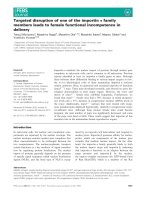cubism was one of the strongest art movements in the 20th century
Bạn đang xem bản rút gọn của tài liệu. Xem và tải ngay bản đầy đủ của tài liệu tại đây (35.55 KB, 1 trang )
Cubism was one of the strongest art movements in the 20th century that gave birth to many other
movements such as futurism and suprematism. The Forefathers of this revolutionary way of
painting were Pablo Picasso and George Braque. Although it may have seemed to be abstract and
geometrical to an untrained eye, cubist art do depict real objects. The shapes are flattened onto
canvas so that different sides of each shape can be shown simultaneously from many angles. This
new style gave a 3 dimensional look on the canvas. The cubist movement gave rise to an
extraordinary reassessment of the interaction between form and space changing the course of
western art forever. The groundbreaking Demoiselles d'Avignon was controversial not only for the
way the women looked but also for the positions of the women. Although Picasso did not
emphasize on detail, he "saw that the rational, often geometric breakdown if the human head and
body employed by so many African artists could provide him with the starting point for his own
re-appraisal of his subjects"(Cubism 53). "The naked women become inextricably bound up in a
flux of shapes or planes which tip backwards and forwards from the two-dimensional surface to
produce much the same sensation as an elaborate sculpture "(Cubism 54). Futurism was an art
movement, which was influenced by cubist art. Cubism showed no motion it was futurism that was
fascinated with machinery, transport and communications. In paintings and sculpture, angular
forms and powerful lines were used to convey a sense of activity, this was a Futurist's way of
showing motion and speed. One of it's innovator's was Umberto Boccioni who said "We want
represent not the optical or analytical impression but the physical and total experience" (Futurism
101). "They now pinned less faith on the power of new subject matter and strove to complement
their colour divisionism with fragmentation of the cubist sort" (Futurism 101). Suprematism was
influenced by cubism because of it geometric shapes but "suprematism was not so much a
movement in art as it is an attitude " (Suprematism 138). This non-movement was created by
Kasmir Malevich's , "His elemental forms were designed both to break the artist's conditioned
responses to his environment and create new realities 'no less significant then the realities of
nature herself'" (Suprematism 138). A suprematist work, banishes every trace of subject, it used
color and form and there interaction to form a subject. While cubism had definite subject it was
also the interaction of color and shape that made the subject. Constructivism was influenced by
suprematism, this movement swept away traditional notions about art, believing that it should
imitate the forms and processes of modern technology. "Often constructivism was overtly
propagandist in nature: sometimes by the placement of simple geometric forms in the kind of
literary context which turns such forms into representations " (Constructivism 161). De Stijl was
mostly influenced by painters Piet Mondrian, Theo Van Doesburg and architect Gerrit Rietveld.
These men believed that art should strive towards complete harmony, order clarity in a constant
process of refinement. The works in this movement were of course geometrical, using mainly
square forms. The movement's forms were deeply philosophical and were rooted in the idea that
art should in some way reflect order. All of these movements progressed from cubism (hence my
title); they developed from shapes into other worldly meanings. They all branched out to their own
ways and fell to their feelings and desirers. All of these movements developed from geometrical
objects to seem as a true form such as a body or face then turn into a geometrical form. All of
these innovators thought differently, they wanted to change everyone else's state of mind and with
their unlikely way of thinking they have. But we have become so accustomed to it that we do not
recognize it and take these powerful shapes and colors for granted


![Báo cáo khóa học: Selective release and function of one of the two FMN groups in the cytoplasmic NAD + -reducing [NiFe]-hydrogenase from Ralstonia eutropha pptx](https://media.store123doc.com/images/document/14/rc/gg/medium_ggg1394180403.jpg)






